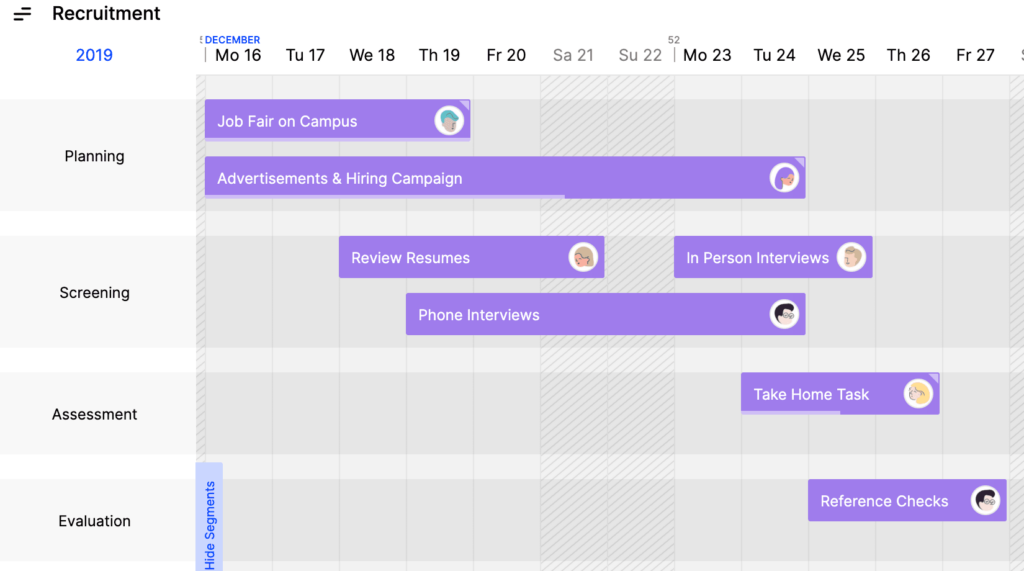When you are in charge of many different people, tasks, and projects, staying on top of things can feel nearly impossible at times. From meeting deadlines to handling task delegation, you have a constant list of problems to worry about. Technology can help you track some details, but a weekly review with each member of your team is a great way to stay on track and ensure your workflow is well-maintained.
More importantly, weekly updates help your employees meet with you and report on their progress. They also give you the chance to motivate your team members and get feedback about your own practices. Through your weekly reviews, you can become a more effective and efficient manager.

What is a Weekly Review?
Ideally, a weekly review will help refocus the energy of both you and your team on a consistent basis. It allows you to prepare for the week ahead. It often takes as little as 30 minutes to an hour to organize your thoughts for the week ahead and plan ahead for all of your projects.
This weekly checklist helps you prioritize tasks, so you can get everything done correctly and on time. When you do the same kind of review with each of your teammates, it helps you streamline your task delegation and management process. You’ll need to organize your tasks, look at your priorities, and determine which people you need to follow up with.
During your special, dedicated weekly review time, you and your employee shouldn’t be working on tasks. Instead, your review time should be spent sorting out the upcoming week’s schedule and figuring out how much was accomplished during the week before. With a bit of planning, you and your team members can learn how to better prioritize time, energy, and other resources for the week to come.
Benefits of a Weekly Review
Once you start doing a weekly review on a regular basis, you’ll discover a number of important benefits. From saving time to reducing stress, there are many reasons why people turn to this technique for organizing their work life. It’s especially important for managers because you can consider the week in review for each of your team members.
1. Save Time and Money
Ultimately, the goal of any business is to turn a profit. Tools like Toggl Plan’s project management software help you organize the workweek and delegate tasks for better performance. Using a weekly checklist also helps to run the one-on-one meeting smoothly from start to finish.
When your team deals with a problem, tackling the issue right away is rarely the best solution. By conducting reviews, you help delegate different skillsets toward varying parts of the problem. You are also able to devote your resources intelligently since you planned ahead.
2. Become a Better Manager
As Theodore Roosevelt once pointed out, letting your employees do their work and taking a step back is sometimes the best choice. If you micromanage everything, your employees will second guess their decisions and be afraid to take the initiative. Instead of hovering over each detail, spend more time looking at the week in review after the fact.
In addition to reducing a manager’s tendency to micromanage, regular reviews are also a chance for you to get feedback. Do your team members need extra help? Are you truly being the best boss possible?

Your review meetings are a chance to learn how you can help your team members do their best work. Don’t be afraid to ask them about the different ways you can help them succeed. Smart managers are always ready to learn, develop, and grow as leaders.
3. Improve Communication
When there are multiple people involved in a project, it’s easy for miscommunications to arise. Instead of assuming everyone understands, you can see if they know what to do by meeting with them on a regular basis. This gives you a chance to check their progress and discuss the project.

This kind of communication also helps to get your employees engaged. Today, human resource departments are constantly focused on boosting employee engagement. By regularly checking on people, you can quickly see how engaged they are and motivate them to continue their work with maximum effort.
4. Make Your Year-End Reviews Less Stressful
Year-end reviews tend to be extremely stressful for employees, and employers are often stressed as well because they have to share difficult feedback. In reality, these reviews are extremely unfair to the employee. If something is a big enough problem to be a topic in the year-end review, it should be brought up much earlier.
Weekly reviews are a way for you to address problems early on. In addition to reducing their stress, this technique allows your employees a chance to improve before they lose an end-of-year raise.
5. Achieve Goals
By meeting up weekly, you make goal setting easier. In each review, you can discuss new goals and better ways to achieve current objectives. Your weekly meetings allow employees to stay on track as they work toward your company’s goals.

While your timeline might not be static and unchanging, it’s still important to include it in your review. In one study, researchers found people were 33% more successful at achieving goals if they wrote them down. By working together to formulate set goals, you and your team are more likely to achieve them.
How to Do a Weekly Review
If you need help with your Getting Things Done (GTD) weekly review, platforms like Toggl Plan can help you track everyone’s individual goals, monitor their progress and delegate new tasks. For your GTD weekly review to be successful, you need to successfully schedule, maintain, and run your reviews each week without any interruptions. Doing things like keeping the door closed can help you and your team members focus on the review.

To do this, avoid rescheduling your meetings. Not only is it important to have regular meetings, but never rescheduling them shows your team members how much you value each review meeting. Writing it on the calendar and reminding your team members about their individual review are also important.
In your review, you’ll want to discuss how much was accomplished and look at how well they are meeting their overall timeline for the tasks. Then, the next step is to consider your plans for the future.
Your team members should be involved throughout this process. As the people in charge of doing the tasks, they are well-placed for offering you suggestions about different milestones and the timeline. Through your shared efforts, you and your team can create a better plan for the upcoming week or month.
Weekly Review Template
There’s no perfect way to complete a weekly review since every industry has different measurables and goals. But there are a handful of standard processes you can follow which will allow you to learn the most essential information during these brief meetings. Here’s a weekly review template to get you started on the right track.
Summary of Last Week
Open your one-on-one with a brief conversation about your team member’s past week. Ask them about the best parts of their week and what stood out as successes. This can be anything from goals they completed to extra work they accomplished outside of their typical routine.

Also, take the time to discuss ways they could have improved. Go over things they could have done better or ways they can be more productive moving forward.
For both the ‘wins’ and the ‘improvements’ portions of the weekly review, allow both sides to be part of the discussion. Allow them to share their own thoughts first about both and then add your own insights into things you feel they did well and one or two things which might help them improve over the next week.
Review of Current Goals
As you dive into a deeper look of the week in review, you’ll want to identify and review their up-to-date goals. Ask for details about their progress on each item and the steps they’ve taken toward reaching any deadlines or milestones. Even a quick update will keep you in the loop and keep them accountable to their goals over the next seven days.
Follow-up on KPIs
Paired with each project milestone on your employee’s list, you should set Key Performance Indicators (KPIs) to track how things are going. These KPIs help all parties involved understand the most urgent aspects of their job and make it easier to see the progress. Maintaining a weekly checklist of these measurables is a great way to follow-up each time.
Plans for Coming Week
In an ideal scenario, your team should have an annual plan prepared to make this step easy. Take a moment to review their standard tasks for the upcoming week. You may also review any duties they have during that time which may be out of the norm from their usual schedule.
Open for Questions
Finish up your weekly review with an open Q&A session. Give your team member the chance to ask any questions they may need answers to for them to be successful before their next weekly review. Once they’ve asked all of theirs, make sure you ask one or two of your own to ensure they don’t need any extra assistance or support from you in the coming week.
Discovering the Advantages of Regular Weekly Reviews
Best of all, conducting a weekly review isn’t difficult. All it takes is planning out a set time to meet with each employee. Then, you briefly address the previous week and your plans for the upcoming week.
Whether you use online team management tools or a whiteboard at the office, there are many effective ways to organize your team and boost their efficiency. Once your reviews are completed, update your calendars to reflect any changes. Afterward, everyone can get started on their task for the week and help out with other projects on the calendar as they finish doing their work.
Want more high-quality tips and tactics for running your team? Check out the Toggl Plan blog for constant updates and power-driven articles!
Logan Derrick is a full-time business writer and content marketing strategist. For years, he has worked closely with several project management professionals, learning from them and increasing his own knowledge of the industry. Having held multiple management positions in fields ranging from customer service to marketing, Logan has found a passion for helping others learn about project management, marketing, and the powerful tools available to professionals today.

